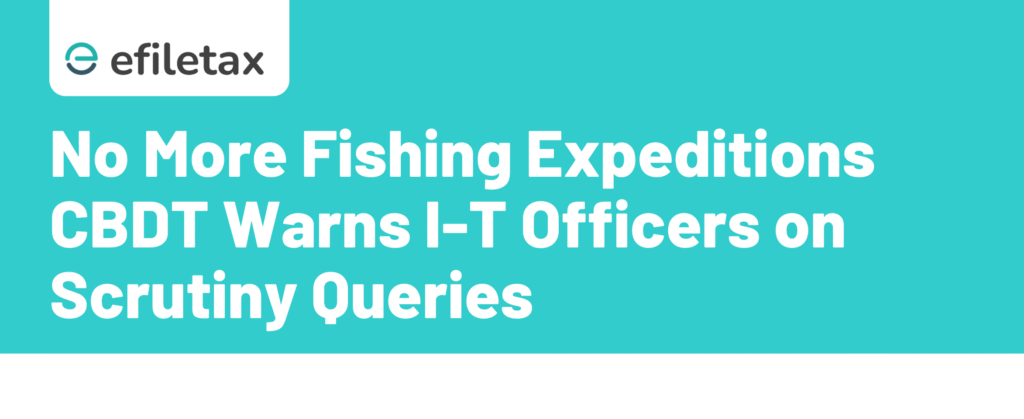
Ask justified, specific questions from taxpayers during scrutiny CBDT to I-T officials
The Central Board of Direct Taxes (CBDT) has issued a crucial instruction to all Income Tax officials: be specific, not vague while questioning taxpayers during scrutiny assessments. This move aims to reduce unnecessary harassment and improve taxpayer confidence.
Let’s break down what this means for you.
Why this instruction matters
Many taxpayers facing scrutiny under the Income Tax Act often complain about receiving broad or irrelevant questions from Assessing Officers (AOs). These generic queries delay assessments and create compliance burdens.
To tackle this, CBDT Instruction No. 1/2025 (dated June 2025) directs AOs to:
- Avoid vague or fishing inquiries
- Stick to facts relevant to the flagged issue
- Justify each question with documented reasons
- Use pre-scrutiny documentation like risk parameters, AIR, STR, etc.
What scrutiny questions should look like now
| Old Style | New Style (Post CBDT Instruction) |
|---|---|
| “Explain all bank transactions.” | “Explain credit of ₹25 lakh on 14.12.2024 in SBI A/c ending 9821.” |
| “List all foreign travels.” | “Provide details of Dubai trip in Feb 2024 reported in AIR.” |
| “Submit property documents.” | “Submit sale deed for plot sold on 22.03.2024 in Jaipur (per Form 26AS).” |
Expert View: Transparency is now a legal expectation
“This instruction is not just administrative—it strengthens taxpayer rights under Article 265 of the Constitution. Assessment must now follow the rule of law, not whims,” says CA Harish Tiwari, a Delhi-based tax consultant.
Legal Reference
- CBDT Instruction No. 1/2025, dt. June 2025
- Section 143(2) & 142(1) of the Income Tax Act, 1961
- SC Rulings: GKN Driveshafts (India) Ltd. v. ITO – AO must disclose reasons and give opportunity for rebuttal
- Delhi HC: Blanket questionnaires are abuse of process – CIT v. Sahara India
What should taxpayers do during scrutiny?
If you’re served with a scrutiny notice:
- Check if the questions relate to flagged issues
- Ask for clarification if any query seems unrelated or vague
- Respond with documented evidence (bank statements, invoices, PAN, etc.)
- Take professional help from a CA or tax consultant
- Know your rights – AOs must justify each demand
Internal Link
Also read: Can I switch tax regime while filing ITR?
CBDT’s goal: Ease of doing tax compliance
This change aligns with the government’s broader Faceless Assessment and Ease of Doing Business goals. It ensures that:
- Small businesses aren’t burdened with irrelevant queries
- Compliance is faster and less confrontational
- Tax authorities remain accountable
Summary
CBDT instructs Income Tax officers to ask justified, specific questions during scrutiny, avoiding vague or generic queries. This reduces taxpayer harassment and aligns with constitutional rights and Supreme Court rulings.
FAQ – Scrutiny Questions Income Tax
Q1. Can I refuse to answer vague scrutiny questions?
Yes, you can seek clarification or object if a question doesn’t relate to your case.
Q2. What if I get a generic questionnaire?
You can escalate the issue through your representative or file a written objection citing CBDT guidelines.
Q3. Are all scrutiny cases eligible for faceless assessment?
Most are, unless marked for special circumstances like search/survey cases.
Closing Note
Facing a scrutiny notice? Don’t panic. Stay calm, respond smartly, and get expert help. At Efiletax, we help individuals and businesses handle scrutiny notices, assessments, and representations with legal accuracy and ease.